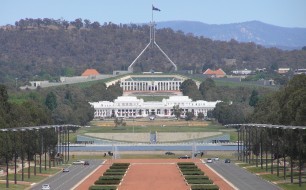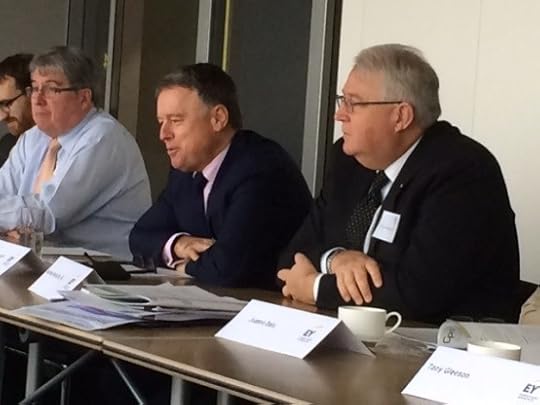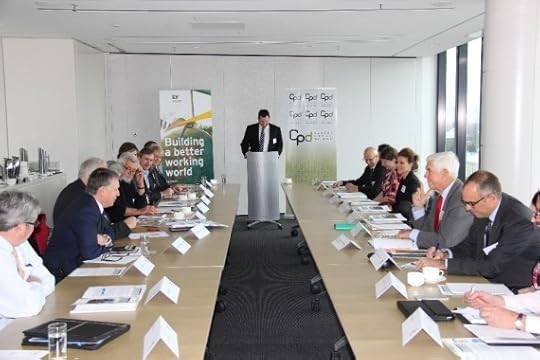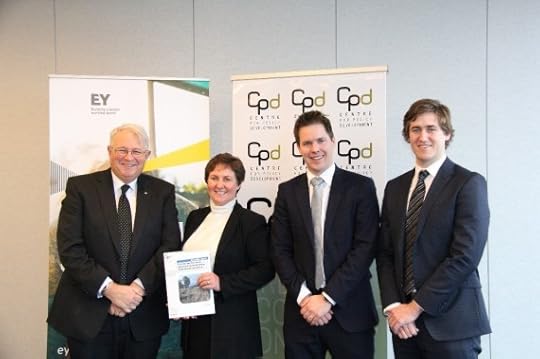Centre for Policy Development's Blog, page 44
September 15, 2015
Op-ed: Weakness And Crisis Lie At The Heart Of Australian Politics | Thought Starters
Published in The Huffington Post Australia, 16 September 2015
Installing our fifth Prime Minister in five years is not a proud position for Australia to be in. Since 2010, Australia has plunged into a particularly brutal and weak era of national politics in which good governance has given way to survival. The BBC has called Canberra the coup capital of the democratic world.
The volatile and uncertain context within which Australian Prime Ministers currently govern is untenable. Australia is a country in crisis; not because of economic calamity or threatened borders, but because we are entering an era of significant transition but cannot find a steady direction to steer, nor someone reliable to take the helm. The normalisation of political coups and short-lived Prime Ministerships are symptomatic of a country struggling to embrace the big-picture challenges of the 21st century, too timid to upset a faltering status quo.
Immediately following the Global Financial Crisis we were the envy of the developed world. In May 2011, The Economist published an article entitled ‘Australia’s Promise: The next Golden State’. The piece argued that Australia had the rare opportunity of using uninterrupted prosperity to deliver long-term reform and diligently prepare the country for a more complex, challenging future. But the article fatefully observed, ‘they appear introverted and unable to see the big picture. Little legislation of consequence has been passed since 2003′.
We are missing our moment to build the Golden State and it is questionable whether a change of Prime Minister alone is sufficient. BBC Correspondent Nick Bryant released a new book, The Rise and Fall of Australia, cataloguing our national slump. In his synopsis he states, ‘its recession-proof economy is the envy of the world. It’s the planet’s great lifestyle superpower. But its politics have never been so brutal, narrow and facile, as well as such a global laughing stock’.
The causes of our malaise are increasingly apparent. Paul Kelly rightly points to the fact that prolonged prosperity has led to rent-seeking behaviour by corporations and individuals alike, who are determined to preserve their benefits in the status quo and stifle reform. Indeed powerful corporate interests hold immense and unequal sway in Canberra. They ensure our leaders’ timid political response to the long-term issues. There are over 580 registered lobbyists working Canberra corridors, with 185 of these being former Government representatives.
Australia has seen the proliferation of career politicians who are themselves democratic rent seekers, concerned with their survival as first priority because their livelihood depends on it. We have a commercial industry of advisers, detached from the community but connected to the key influencers outside government. As the number of federal political staffers doubled to 590 between 1984 and 2014, the policy rigour of the public service slowly diminishes due to creeping politicisation, budget cuts and accelerated outsourcing.
Our national debate is failing us as well. Al Gore called the problem ‘the assault on reason’. Mainstream, commercial media outlets take either political, ideological or sensationalist grounds in reporting current affairs. They are players in the game, not spectators in the stands. Rarely do we have a logical policy debate on the best evidence available. This makes reform even harder to undertake and understand.
Many polls now demonstrate that Australians feel increasingly detached from their democracy, unable to effect genuine change at the ballot box. In the late 19th century, the US experienced a similar era to our current one, what Mark Twain called ‘the Gilded Era’.
The Gilded Era was a period characterised by a succession of weak, one-term presidents (seven in a row), including a president who lost after one term then won again four years later, eerily familiar to Australian leadership in 2015.
It was a period of immense prosperity for some, mainly the growing family corporations around the country. Progressive reform and social change was stifled. It was a period of sharpening inequality going unaddressed by politicians reluctant to confront corporate influence. The torpor of the Gilded Era ended accidentally, as the assassination of President McKinley allowed the reformist zeal of Theodore Roosevelt to emerge.
We are perilously close to entering the same period. Instead of building the Golden State, Australia is becoming the Gilded State, glittering in flaky gold on the surface masking the dullness at our core.
New leadership does not guarantee reform. Prime Minister Malcolm Turnbull claimed that Australia must embrace a changing world in order to be competitive and prosperous. However. he has already ruled out changes to the Government’s positions on emissions reductions, as well as flashpoint social issues like refugee policy and marriage equality. Moderates on all sides are waiting to see if actions can keep up with the new Prime Minister’s rhetoric.
The Turnbull Cabinet will inherit an economy urgently in need of structural transition and a growing global emphasis on sustainability and wellbeing. We have entered a new, harsh phase of climate change which threatens Australia’s health, food, agriculture, regions and cities. Crucially, our democratic institutions are waning and in desperate need of renewal.
How Malcolm Turnbull opens up the national agenda, and whether he will lead the community towards a golden or gilded future, remains to be seen.
Photo: Veni (ITU Plenipotentiary 2014)

The post Op-ed: Weakness And Crisis Lie At The Heart Of Australian Politics | Thought Starters appeared first on CPD.
Op-ed: Weakness And Crisis Lie At The Heart Of Australian Politics
Published in The Huffington Post Australia, 16 September 2015
Installing our fifth Prime Minister in five years is not a proud position for Australia to be in. Since 2010, Australia has plunged into a particularly brutal and weak era of national politics in which good governance has given way to survival. The BBC has called Canberra the coup capital of the democratic world.
The volatile and uncertain context within which Australian Prime Ministers currently govern is untenable. Australia is a country in crisis; not because of economic calamity or threatened borders, but because we are entering an era of significant transition but cannot find a steady direction to steer, nor someone reliable to take the helm. The normalisation of political coups and short-lived Prime Ministerships are symptomatic of a country struggling to embrace the big-picture challenges of the 21st century, too timid to upset a faltering status quo.
Immediately following the Global Financial Crisis we were the envy of the developed world. In May 2011, The Economist published an article entitled ‘Australia’s Promise: The next Golden State’. The piece argued that Australia had the rare opportunity of using uninterrupted prosperity to deliver long-term reform and diligently prepare the country for a more complex, challenging future. But the article fatefully observed, ‘they appear introverted and unable to see the big picture. Little legislation of consequence has been passed since 2003′.
We are missing our moment to build the Golden State and it is questionable whether a change of Prime Minister alone is sufficient. BBC Correspondent Nick Bryant released a new book, The Rise and Fall of Australia, cataloguing our national slump. In his synopsis he states, ‘its recession-proof economy is the envy of the world. It’s the planet’s great lifestyle superpower. But its politics have never been so brutal, narrow and facile, as well as such a global laughing stock’.
The causes of our malaise are increasingly apparent. Paul Kelly rightly points to the fact that prolonged prosperity has led to rent-seeking behaviour by corporations and individuals alike, who are determined to preserve their benefits in the status quo and stifle reform. Indeed powerful corporate interests hold immense and unequal sway in Canberra. They ensure our leaders’ timid political response to the long-term issues. There are over 580 registered lobbyists working Canberra corridors, with 185 of these being former Government representatives.
Australia has seen the proliferation of career politicians who are themselves democratic rent seekers, concerned with their survival as first priority because their livelihood depends on it. We have a commercial industry of advisers, detached from the community but connected to the key influencers outside government. As the number of federal political staffers doubled to 590 between 1984 and 2014, the policy rigour of the public service slowly diminishes due to creeping politicisation, budget cuts and accelerated outsourcing.
Our national debate is failing us as well. Al Gore called the problem ‘the assault on reason’. Mainstream, commercial media outlets take either political, ideological or sensationalist grounds in reporting current affairs. They are players in the game, not spectators in the stands. Rarely do we have a logical policy debate on the best evidence available. This makes reform even harder to undertake and understand.
Many polls now demonstrate that Australians feel increasingly detached from their democracy, unable to effect genuine change at the ballot box. In the late 19th century, the US experienced a similar era to our current one, what Mark Twain called ‘the Gilded Era’.
The Gilded Era was a period characterised by a succession of weak, one-term presidents (seven in a row), including a president who lost after one term then won again four years later, eerily familiar to Australian leadership in 2015.
It was a period of immense prosperity for some, mainly the growing family corporations around the country. Progressive reform and social change was stifled. It was a period of sharpening inequality going unaddressed by politicians reluctant to confront corporate influence. The torpor of the Gilded Era ended accidentally, as the assassination of President McKinley allowed the reformist zeal of Theodore Roosevelt to emerge.
We are perilously close to entering the same period. Instead of building the Golden State, Australia is becoming the Gilded State, glittering in flaky gold on the surface masking the dullness at our core.
New leadership does not guarantee reform. Prime Minister Malcolm Turnbull claimed that Australia must embrace a changing world in order to be competitive and prosperous. However. he has already ruled out changes to the Government’s positions on emissions reductions, as well as flashpoint social issues like refugee policy and marriage equality. Moderates on all sides are waiting to see if actions can keep up with the new Prime Minister’s rhetoric.
The Turnbull Cabinet will inherit an economy urgently in need of structural transition and a growing global emphasis on sustainability and wellbeing. We have entered a new, harsh phase of climate change which threatens Australia’s health, food, agriculture, regions and cities. Crucially, our democratic institutions are waning and in desperate need of renewal.
How Malcolm Turnbull opens up the national agenda, and whether he will lead the community towards a golden or gilded future, remains to be seen.

The post Op-ed: Weakness And Crisis Lie At The Heart Of Australian Politics appeared first on CPD.
September 9, 2015
CPD Fellow Peter Hughes: “Is our region ready for a displacement crisis?”
Asia and Pacific governments need to increase their preparedness both at the national level, and collectively, to understand the nature of any displacement and to have the capacity to respond, writes Peter Hughes.
The daily media continues to record the extraordinary surge of humanity across land and sea from the Middle East and Africa into Europe.
No one can be oblivious to the mass human misery and individual tragedies revealed every day.
Germany alone is expected to receive 800,000 asylum seekers in 2015. Over 11 million Syrians have been displaced with four million having fled into neighbouring countries. This is on top of continuing large movements of people into Europe from Afghanistan, Eritrea and other parts of south-west Asia and Africa. Statistics on these flows are out of date as soon as they are issued.
The European Union, one of the most wealthy and sophisticated regions of the world, with extensive capabilities to manage asylum and migration, has been overwhelmed.
Despite the existence of a common asylum policy, the main responsibility for looking after the inflow of people has fallen on to Germany and Sweden. Border States are unable to cope effectively – with or without restrictive policies. Efforts to develop a shared responsibility arrangement amongst European Union members have not yet been successful.
There is no sign of these mass movements abating. The world is facing its highest level of displacement since the Second World War with some 59.5 million people displaced at the end of 2014, an increase of some 8.3 million people over the previous year.

Image by michael_swan on Flickr. https://www.flickr.com/photos/mmmswan...
How well would we cope with displacement on this scale in Southeast Asia and the Pacific?
Countries in the region have not had to deal with mass displacement since the Indochinese refugee crisis in the period 1975–1990. At that time, with the help of the USA and Europe, the displacement of three million people was managed through first asylum in regional countries, resettlement of 2.5 million refugees around the world (including many to Australia) and repatriation of another 500,000 people.
The challenges in recent decades have been less, but not insignificant.
The main sources of displacement into the region have been from Myanmar, Sri Lanka and the Middle East.
Thailand continues to host over 600,000 people registered with UNHCR, including over 500,000 stateless people. Malaysia hosts some 200,000 asylum seekers, refugees and stateless persons of whom over 90 per cent originate from Myanmar. Indonesia hosts over 11,000 people seeking international protection. These populations are relatively stable.
Australia has ended up dealing largely unilaterally with the smuggled flow of maritime asylum seekers through deterrence measures, but still has some 30,000 asylum seekers in the country awaiting resolution of their status.
The region cannot just hope to remain immune from the global trend of increased displacement. We will need to be ready to deal with the human consequences of unexpected large-scale movements.
The recent mini-crisis of Rohingyas in the Andaman Sea gives a pointer to how well, or otherwise, a major displacement crisis might be handled in our region.
The initial reaction of regional countries, operating unilaterally, was to push off arriving boats.
The Bali Process on People Smuggling, Trafficking in Persons and related Transnational Crime did not appear to have any direct role in orchestrating a collective response. It was also hard to detect any ASEAN action until a couple of months later when it called an emergency Ministerial meeting on transnational crime and irregular movement of persons.
After an initial crisis meeting between Ministers from Indonesia, Malaysia and Thailand, the focus of collective action was a one-off “Special Meeting on Irregular Migration in the Indian Ocean” between 17 countries convened in May 2015 by the Royal Thai government. The meeting articulated some sound short-term responses, but the underlying problem has not been solved.
That tentative response to a relatively small, but acute, incident of displacement does not give confidence that we are regionally well-prepared for something bigger. Governments instinctively focus largely on uncoordinated national responses.
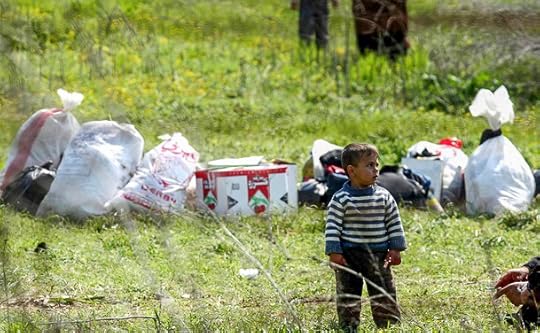
Image by Freedom House on Flickr. https://www.flickr.com/photos/syriafr...
One possible source of thinking on ways to develop better collective regional responses for the future is a Track 2 Dialogue on Forced Migration in the Asia-Pacific initiated by the Centre for Policy Development in Melbourne.
Dialogue members are from Indonesia, Thailand, Malaysia and Australia, along with the Offices of the United Nations High Commissioner for Refugees and the International Organization for Migration.
The focus of the dialogue is better policy responses to those forms of migration within, and into, the Asia-Pacific region which are proving the most difficult for governments to manage – the movement of asylum seekers, refugees and trafficked persons. It is not about the problems of any one country, but those that are likely to challenge many countries.
The dialogue involves both government officials and civil society experts. The first meeting, in a three-year process, was held in Melbourne at the end of August. Because the dialogue operates outside of the formal structures of government, it offers the possibility of original and innovative thinking on displacement.
Wherever the thinking comes from, governments in this region will have to increase their preparedness both at the national level, and collectively, to understand the nature of any displacement and to have the capacity to respond appropriately to all aspects – initial humanitarian needs, protection, durable solutions, irregular migration, economic migrants, migrants smuggling and migrant trafficking
Peter Hughes is a Visiting Fellow at Crawford School of Public Policy and the Regulatory Institutions Network at The Australian National University and a Fellow at the Centre for Policy Development.
This piece was first published on Policy Forum, the website of the Asia and the Pacific Policy Society: http://www.policyforum.net/getting-ready-to-respond/
For more information on the Track II Dialogue on Forced Migration in the Asia Pacific, click here.

The post CPD Fellow Peter Hughes: “Is our region ready for a displacement crisis?” appeared first on CPD.
September 8, 2015
Analyst Rob Sturrock gives Oration at Third Population Health Congress, September 2015
Drawing on the recent release of The Longest Conflict: Australia’s Climate Security Challenge , Rob spoke on the human security impacts that a changing climate will have on community health, including the implications for the Indo-Pacific region. This discussion outlined the effects that extreme weather, natural disasters and resource scarcity will have not just on mortality or morbidity, but on broader social and political instability and the likelihood of conflict.

Some of the key trends Rob highlighted included the following:
Extreme heat across the Middle East this northern summer led to social instability and riots in Baghdad.
Pakistan suffered more deaths from heat stress this year than it has from terrorist attacks.
Climate-induced, prolonged drought exacerbated social instability that led to uprisings in Syria and Egypt.
Resource scarcities and competition for food, water and energy will likely affect geopolitics in the Indo-Pacific within the next two decades.
Australia will increasingly be called upon to provide humanitarian assistance to vulnerable communities ravaged by natural disasters in the region.
Rob emphasised the need for community leadership on adaptation and mitigation, saying we retain the agency to act on climate change, and citing the work already underway at the city and regional level. He also advocated for deeper regional engagement through Australia’s official aid program, particularly to help our neighbours and partners alike to improve their climate adaptation and resilience.
The speech generated significant discussion on social media amongst the Congress attendees. You can read the full speech here: Oration to Population Health Congress

The post Analyst Rob Sturrock gives Oration at Third Population Health Congress, September 2015 appeared first on CPD.
September 6, 2015
CPD – EY roundtable on agricultural sustainability | 12 August 2015
In August CPD was delighted to host leaders from across the Australian agricultural sector to discuss how to seize the potential of ‘virtuous cycles’ in agriculture, and entrench sustainability at the heart of the strategic vision for the sector.
The roundtable doubled as a launch of CPD’s discussion paper ‘From vicious to virtuous cycles: a sustainable future for Australian agriculture’.
The discussion was hosted by EY in Canberra, and was moderated by Mr Andrew Metcalfe AO, former Secretary of the Department of Agriculture. Major General Michael Jeffery AC CVO MC, former Governor General and now National Advocate for Soil Health, delivered opening remarks.
We were also joined by Shadow Minister for Agriculture and Member for the Hunter the Honorable Joel Fitzgibbon MP, senior representatives from industry associations, business, academia and government, as well as farmers with first-hand experience of regenerative agricultural practices. Government departments and agencies represented included the Departments of Agriculture and Environment, the Australian Bureau of Statistics, Austrade, and the CSIRO.
Shadow Minister for Agriculture Joel Fitzgibbon (l) and EY Partner Andrew Metcalfe (r)
In his opening remarks, General Jeffery framed growing food demand and climate change as two key global challenges with major ramifications for Australia. He emphasised that Australia has good farmers and scientists who are making progress on soil health and sustainability – but that this effort must be pulled together in a national way. Fixing what happens in the paddock is one thing, but to do that you need to get the government policy settings right – something that can only be achieved with a coherent vision of how the totality of Australia’s landscapes can enjoyed and protected by all users, including agriculture.
The roundtable then heard from Sue Ogilvy, lead author of CPD discussion paper From vicious to virtuous cycles: a sustainable future from Australian agriculture. Sue highlighted the sustainability and productivity potential being demonstrated by ‘first practice’ farmers who had embraced regenerative practices. She also emphasised that the progress on sustainability that farmers were already making needs to be supported by better price signals and support for innovation throughout the entire agricultural supply chain.
The discussion that followed, which was held under Chatham House rules, explored two main topics: how to take advantage growing demand for sustainable products, and the role that natural capital accounting and other measurement techniques could play in supporting better information and market-led outcomes.
Key points raised by participants included:
The importance of recognising the progress farmers have already made in shifting the conversation from landscape degradation to restoration.
The role that exciting new ‘big data’ capabilities would play in contributing to improved productivity and sustainability outcomes.
The need for a more sophisticated discussion in the sector about how to push a competitive edge based on differentiated products with verifiable sustainability and quality attributes.
The importance of putting existing data and knowledge together – including to develop the time series data that is crucial to tracking sustainability and other outcomes over time.
CPD CEO Travers McLeod concluded the discussion by reflecting on the importance of linked-up thinking between different participants in the sector. He noted that siloed thinking and barriers to collaboration in R&D reflected challenges that are apparent across Australia’s innovation system – issues that CPD has taken up in other research.
CPD would like to thank all participants for their contribution to an excellent discussion, and to EY for their support in hosting the roundtable.
Coverage and related media
Colin Bettles, national political correspondent from Fairfax Press, published a summary of the discussion in The Land on 25 August: Sustainable ag must pay.
Major General Jeffery was interviewed by The Land on 25 August: White Paper ‘missing’ soil health
Major General Jeffery also wrote an op ed on soil, water and food security in The Australian on 29 August: Australia cannot remain secure in a food and water insecure world
Tim Wright – whose property Lana in Uralla, NSW was featured on the cover of the CPD discussion paper – spoke to The Land in August about using new land management practices to improve drought resilience: All dry and mighty
Quotes and reactions
Andrew Metcalfe: “EY was delighted to co-host the launch of CPD’s discussion paper and the accompanying roundtable on agricultural sustainability. The success and sustainability of agriculture is something all Australians have a major stake in, and it is essential that we take a broad and long term view of the challenges and opportunities in the sector. Bringing different viewpoints and unusual suspects together to tackle vexed and complex policy issues is vital – and this is a real strength of CPD’s approach. We are committed to playing a continuing role in helping to facilitate and deliver on these conversations.”
Sue Ogilvy: “Farmers are extraordinarily important because of their role in looking after our landscape and because this requires an amazing range of skills and capabilities. But businesses and consumers that enjoy the benefits provided by farmers have not traditionally shared either the responsibility or the benefits fairly. If we want more from farmers – if, in addition to good food and fibre, we want better soil, more biodiversity and healthier waterways, we must be prepared to create the markets and the supply chains that recognise and reward the farmers for delivering it”
Travers McLeod: “The discussion demonstrated the expertise and commitment of the key players across the sector when it comes to sustainability. What is lacking is a strategic vision for agriculture that puts sustainability at its core. Any other strategy would be self-defeating because in the long run profitability, productivity and sustainability are bound up together. But this is about more than just being defensive – strong performance on sustainability could offer a major strategic edge as global markets for clean, green, healthy products continue to grow.
(l-r) Andrew Metcalfe, lead author Sue Ogilvy, Travers McLeod and Sam Hurley

The post CPD – EY roundtable on agricultural sustainability | 12 August 2015 appeared first on CPD.
CPD – EY roundtable on agricultural sustainability – 12 August 2015
In August CPD was delighted to host leaders from across the Australian agricultural sector to discuss how to seize the potential of ‘virtuous cycles’ in agriculture, and entrench sustainability at the heart of the strategic vision for the sector.
The roundtable doubled as a launch of CPD’s discussion paper ‘From vicious to virtuous cycles: a sustainable future for Australian agriculture’.
The discussion was hosted by EY in Canberra, and was moderated by Mr Andrew Metcalfe AO, former Secretary of the Department of Agriculture. Major General Michael Jeffery AC CVO MC, former Governor General and now National Advocate for Soil Health, delivered opening remarks.
We were also joined by Shadow Minister for Agriculture and Member for the Hunter the Honorable Joel Fitzgibbon MP, senior representatives from industry associations, business, academia and government, as well as farmers with first-hand experience of regenerative agricultural practices. Government departments and agencies represented included the Departments of Agriculture and Environment, the Australian Bureau of Statistics, Austrade, and the CSIRO.
Shadow Minister for Agriculture Joel Fitzgibbon (l) and EY Partner Andrew Metcalfe (r)
In his opening remarks, General Jeffery framed growing food demand and climate change as two key global challenges with major ramifications for Australia. He emphasised that Australia has good farmers and scientists who are making progress on soil health and sustainability – but that this effort must be pulled together in a national way. Fixing what happens in the paddock is one thing, but to do that you need to get the government policy settings right – something that can only be achieved with a coherent vision of how the totality of Australia’s landscapes can enjoyed and protected by all users, including agriculture.
The roundtable then heard from Sue Ogilvy, lead author of CPD discussion paper From vicious to virtuous cycles: a sustainable future from Australian agriculture. Sue highlighted the sustainability and productivity potential being demonstrated by ‘first practice’ farmers who had embraced regenerative practices. She also emphasised that the progress on sustainability that farmers were already making needs to be supported by better price signals and support for innovation throughout the entire agricultural supply chain.
The discussion that followed, which was held under Chatham House rules, explored two main topics: how to take advantage growing demand for sustainable products, and the role that natural capital accounting and other measurement techniques could play in supporting better information and market-led outcomes.
Key points raised by participants included:
The importance of recognising the progress farmers have already made in shifting the conversation from landscape degradation to restoration.
The role that exciting new ‘big data’ capabilities would play in contributing to improved productivity and sustainability outcomes.
The need for a more sophisticated discussion in the sector about how to push a competitive edge based on differentiated products with verifiable sustainability and quality attributes.
The importance of putting existing data and knowledge together – including to develop the time series data that is crucial to tracking sustainability and other outcomes over time.
CPD CEO Travers McLeod concluded the discussion by reflecting on the importance of linked-up thinking between different participants in the sector. He noted that siloed thinking and barriers to collaboration in R&D reflected challenges that are apparent across Australia’s innovation system – issues that CPD has taken up in other research.
CPD would like to thank all participants for their contribution to an excellent discussion, and to EY for their support in hosting the roundtable.
Coverage and related media
Colin Bettles, national political correspondent from Fairfax Press, published a summary of the discussion in The Land on 25 August: Sustainable ag must pay.
Major General Jeffery was interviewed by The Land on 25 August: White Paper ‘missing’ soil health
Major General Jeffery also wrote an op ed on soil, water and food security in The Australian on 29 August: Australia cannot remain secure in a food and water insecure world
Tim Wright – whose property Lana in Uralla, NSW was featured on the cover of the CPD discussion paper – spoke to The Land in August about using new land management practices to improve drought resilience: All dry and mighty
Quotes and reactions
Andrew Metcalfe: “EY was delighted to co-host the launch of CPD’s discussion paper and the accompanying roundtable on agricultural sustainability. The success and sustainability of agriculture is something all Australians have a major stake in, and it is essential that we take a broad and long term view of the challenges and opportunities in the sector. Bringing different viewpoints and unusual suspects together to tackle vexed and complex policy issues is vital – and this is a real strength of CPD’s approach. We are committed to playing a continuing role in helping to facilitate and deliver on these conversations.”
Sue Ogilvy: “Farmers are extraordinarily important because of their role in looking after our landscape and because this requires an amazing range of skills and capabilities. But businesses and consumers that enjoy the benefits provided by farmers have not traditionally shared either the responsibility or the benefits fairly. If we want more from farmers – if, in addition to good food and fibre, we want better soil, more biodiversity and healthier waterways, we must be prepared to create the markets and the supply chains that recognise and reward the farmers for delivering it”
Travers McLeod: “The discussion demonstrated the expertise and commitment of the key players across the sector when it comes to sustainability. What is lacking is a strategic vision for agriculture that puts sustainability at its core. Any other strategy would be self-defeating because in the long run profitability, productivity and sustainability are bound up together. But this is about more than just being defensive – strong performance on sustainability could offer a major strategic edge as global markets for clean, green, healthy products continue to grow.
(l-r) Andrew Metcalfe, lead author Sue Ogilvy, Travers McLeod and Sam Hurley

The post CPD – EY roundtable on agricultural sustainability – 12 August 2015 appeared first on CPD.
August 25, 2015
Triffitt, McLeod dig into the ‘ethically challenged netherworld’ of politicians’ entitlements | Thought Starters 25 August 2015
In a piece that first appeared in The Age (August 13, 2015), Melbourne University lecturer Mark Triffitt and CPD CEO Travers McLeod analyse the ‘ethically challenged netherworld’ of politicians’ entitlements.
When does a political system become corrupt? When is the line crossed from garden variety rorting by a few members of parliament to institutionalised abuse of taxpayers’ money by the system?
The latest scandal over politicians’ entitlements has been like lifting the proverbial rock to discover a deeply, ethically challenged netherworld. One flagrant folly scuttled out, only to be followed by a horde of others.
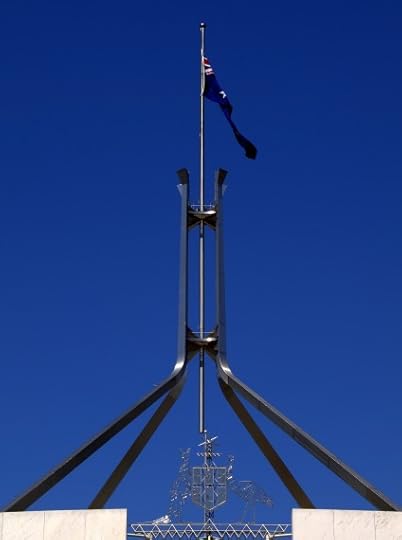 –
–The public has reacted with disgust. And rightly so. This is our money being used for gratuitous chopper rides and flying the family business class to outback resorts.
–
Individual politicians have responded by pointing the finger at everyone and everything except themselves. This includes blaming their transgressions on a “system” of entitlements they created.
The public has reacted with disgust. And rightly so. This is our money being used for gratuitous chopper rides and flying the family business class to outback resorts.
It’s also compounded a growing view that our democratic system has become largely unaccountable and insensitive to citizens and, as a result, is reaching breaking point.
In this hothouse environment of outraged public opinion, it can be easy to exaggerate current events into claims of a full-blown crisis. After all, politicians have been up to these sorts of shenanigans since forever.
So how do we run a ruler over recent transgressions to see if they represent a superficial problem, or something more deeply embedded? Fortunately we have guidelines in the form of an article by American philosopher Amelie Rorty on how and why corruption begins and spreads.
Rorty is concerned with “the gradual corruption of an individual”. But her observations have important implications for the institutions and systems that individuals inhabit.
Her article, “How to Harden Your Heart: Six Easy Ways to Become Corrupt”, says the slippery slide to corruption is rarely obvious or defined by a single event. Instead, it happens by nuance and degrees.
–
As acceptance of small errors compounds, hardens and spreads, self-deception leads to denial. The occasional individual ethical lapse becomes habitual corruption.
–
It usually starts as the result of small errors of judgment. Individuals might rationalise their behaviour as minor infractions and even admit wrongdoing. But no real steps are taken to stamp out these behaviours.
As acceptance of small errors compounds, hardens and spreads, self-deception leads to denial. The occasional individual ethical lapse becomes habitual corruption.
Applying Rorty’s thinking to our national political system provides a disturbing insight into where it is, and where it might be heading.
The conclusion is unthinkable in a country that prides itself and its democratic system as being largely “clean”.
Rorty points to six warning signs that indicate if an individual is moving into the danger zone. The cues are eerily similar to what many in the community now consider to be broader weaknesses of our political system.
The first danger signal is what Rorty calls “attention to the present”. In the context of our political system it’s the overweening obsession with the short term and is potentially dangerous in fostering corruption because it allows wrongdoers to disconnect their present actions from future consequences. Obsessive reliance by MPs on fortnightly opinion polls is but one example of this corrosive impact.
–
This is dangerous because the groupthink it creates provides both protection and support for wrongdoing (what is upheld as the “standard” in Canberra won’t often pass the pub test in Castlemaine).
–
Another warning sign is what Rorty calls “groupie attraction” or “gravitating to the company of like-minded” – a succinct way of describing the Canberra political bubble.
This is dangerous because the groupthink it creates provides both protection and support for wrongdoing (what is upheld as the “standard” in Canberra won’t often pass the pub test in Castlemaine).
Another red flag, “imitating the leader”, is self-explanatory in a political world where parties and Parliaments are increasingly organised around the dictates of their leaders.
“Captain’s calls” are increasingly the norm. The result is political subordinates who struggle to think for themselves. Rorty describes this warning sign as when “newcomers and initiates gravitate to powerful figures. Without realising it, novices emulate the behaviour of those who model ‘how things are done’.”
One final sign is “papering over the cracks”, which Rorty highlights as an attempt to distance the problem from the cause. We have seen this in Canberra via claims the problem lies with the “system” and not the ethical lapses of individuals.
In short, Rorty requires us to face up to the cause, not the symptom.
The entitlements scandal is a sign of alarming and unprecedented corrosion of Australia’s political culture. It has emerged from a succession of suspect individual moral judgments contributing to what is becoming a debased political system. That’s why far-reaching measures are needed to stamp out the rot before more damaging behaviours take hold.
Measures offered by politicians that are likely to tinker with the present expenses system will be insufficient. As Rorty warns, “when corruption is widespread, home-grown prevention can at best provide only some resistance”.
Full, immediate and independent transparency on entitlement use is but the first step on the long road to democratic renewal.
–
Dr Mark Triffitt is a lecturer in public policy at the University of Melbourne.
Dr Travers McLeod is the chief executive officer of the Centre for Policy Development.
–
Image credit: Jim Bowen – CC BY 2.0

The post Triffitt, McLeod dig into the ‘ethically challenged netherworld’ of politicians’ entitlements | Thought Starters 25 August 2015 appeared first on CPD.
Dunlop, Sturrock warn of Australia’s ‘fringe’ status on climate change | Thought Starters 25 August 2015
In a piece that first appeared in The Age (August 14, 2015), CPD fellow Ian Dunlop and CPD analyst Rob Sturrock suggest Australia’s policy on climate change is relegating the country to ‘fringe player’ status on the international stage.
Amid growing pressure and heightened expectations, Australia has announced its intended nationally determined contribution (INDC) target to take to the Conference of Parties in Paris in December.
It reinforces the notion of Australia as climate laggard going against the tide of science, action and opinion.
Tuesday’s announcement provides a meek objective of 26 per cent emissions reduction by 2030, based on 2005 levels. The contribution is inadequate for several reasons. Primarily, it does not contribute to keeping temperature increases to 2 degrees above pre-industrial levels. It does not aid Australia’s decarbonisation of the economy in the longer term.
–
“In remaining a climate laggard, Australia continues to go against the global trend. What has become increasingly obvious recently is that the tide is coming back in on climate change action at home and abroad. A growing international community consensus for action is noticeable.
–
By comparison, the Climate Change Authority called for a minimum reduction of 45 per cent on 2005 levels. Overall, Australia will remain the highest per capita emitter commensurate with its role as a major contributor to the global fossil fuel industry.
It reaffirms that Australia will be a fringe player in Paris, seen as marginal at best and obstructionist at worst in achieving genuine progress. Our commitment is less than Canada’s, another mining-centric climate-sceptic nation.
In remaining a climate laggard, Australia continues to go against the global trend. What has become increasingly obvious recently is that the tide is coming back in on climate change action at home and abroad. A growing international community consensus for action is noticeable.
Recent research by the United States-based Pew Research Centre concluded that climate change was seen globally as the biggest international challenge. New momentum on climate leadership has been provided by the US and China. With these two great powers providing strong leadership, the prospect of substantive progress with the rest of the international community in Paris is high.
The pressure from business, civil society and the public on the Australian government to follow suit is intensifying, and the demands will only persist after this latest announcement. In late June a roundtable comprising divergent stakeholders such as the Business Council of Australia, the Australian Industry Group, the Climate Institute, the Australian Council on Social Service, the Investor Group on Climate Change, and the ACTU demanded the end of the politicking and uncertainty over climate policy and demanded Australia catch up with the rest of the world.
–
Australians also understand the impact climate change has on other areas of life. In a poll recently done for the Centre for Policy Development, 68 per cent of respondents agree that damage to our food supply chain and agriculture from increases in extreme weather is a national security threat.
–
Australians want climate change taken much more seriously; 59 per cent of respondents to a recent Climate Institute survey agreed that the government is under-estimating the seriousness of climate change, and agree that Australia should be a world leader in finding solutions.
Australians also understand the impact climate change has on other areas of life. In a poll recently done for the Centre for Policy Development, 68 per cent of respondents agree that damage to our food supply chain and agriculture from increases in extreme weather is a national security threat.
The government framed the INDC announcement around being economically responsible, but it is reckless for both the short and long term, given the acceleration of climate impacts.
 The business community is increasingly anxious over the future cost of inaction to the economy. Australia is poised to miss out on trade and employment opportunities climate action presents through the development of renewable energy and other climate-based industries, technologies and services. Large-scale renewable energy investment in Australia has fallen a staggering 90 per cent in the 12 months before the announcement of the renewable energy target review.
The business community is increasingly anxious over the future cost of inaction to the economy. Australia is poised to miss out on trade and employment opportunities climate action presents through the development of renewable energy and other climate-based industries, technologies and services. Large-scale renewable energy investment in Australia has fallen a staggering 90 per cent in the 12 months before the announcement of the renewable energy target review.
While the government talks of protecting ordinary households, it ignores the economic pain already being brought by climate change. Assistant Treasurer Josh Frydenberg even admitted that skyrocketing insurance premiums in north Queensland (more than 80 per cent between 2005 and 2013) are attributable to frequent extreme weather in recent years.
Climate change will directly affect our primary industries and our food supply, and place enormous strain on economic and social infrastructure. Yet the government’s Direct Action strategy has been labelled a “holding policy” that fills the vacuum of not having a genuine policy. The economic costs of inaction are mounting while the government makes the hollow case that climate action means a weaker economy.
The Abbott government seems determined to ignore climate science, dispute emerging solutions, downplay international agreements, stymie renewable energy proposals and refuse to accept our responsibility to lead. Tuesday’s announcement is another symptom of our broader policy failure.
Although we are one of the most vulnerable developed nations to climate change, we will remain unwilling to find adequate solutions in our own interests. As a concert of nations go to Paris to capitalise on international momentum, Australia will sit on its own on the shoreline, trying desperately to push back the incoming tide.
–
Ian Dunlop is a fellow of the Centre for Policy Development and was formerly chairman of the Australian Coal Association and chief executive of the Australian Institute of Company Directors. He is a member of the Club of Rome, and a director of Australia21.
Rob Sturrock is a CPD analyst and author of The Longest Conflict: Australia’s Climate Security Challenge.

The post Dunlop, Sturrock warn of Australia’s ‘fringe’ status on climate change | Thought Starters 25 August 2015 appeared first on CPD.
August 23, 2015
Department of Health’s policy and reform potential | John Menadue – Thought Starters
John Menadue considers the ability of the Department of Health to develop good health policy and manage health reform.
I have frequently raised my concerns about the ability of the Department of Health to develop good health policy and manage health reform. A test of the Minister Sussan Ley is whether she can help facilitate the necessary reform. See below links to two earlier articles I wrote on this problem. The first is a capability review of the Department of Heath and Ageing by the Australian Public Service Commission. The second is a report by the Australian National Audit Office of the department’s administration of the Fifth Community Pharmacy Agreement.
Both reports raise very serious issues.
http://johnmenadue.com/blog/?p=3411
http://johnmenadue.com/blog/?p=3453
—
John Menadue is a founder and fellow of the Centre for Policy Development. He was formerly Secretary of the Department of Immigration in the Fraser Government 1980 – 1983, when the Immigration Minister was Mr Ian McPhee. John was also previously Secretary of Prime Minister and Cabinet under Prime Ministers Gough Whitlam and Malcolm Fraser, Ambassador to Japan, and CEO of QANTAS.

The post Department of Health’s policy and reform potential | John Menadue – Thought Starters appeared first on CPD.
August 11, 2015
From vicious to virtuous cycles: a sustainable future for Australian agriculture | DISCUSSION PAPER | August 2015
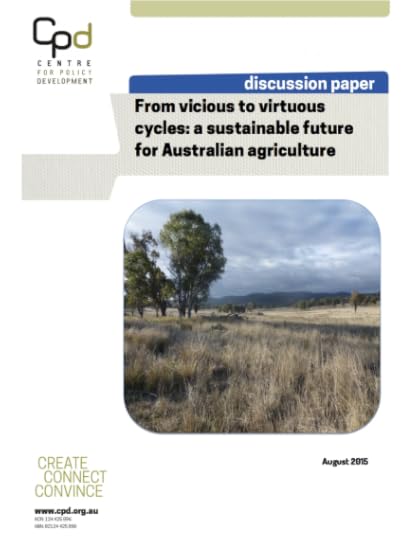 CPD’s latest discussion paper was launched as part of an agricultural sustainability roundtable hosted by Ernst & Young and CPD in Canberra on 12 August 2015.
CPD’s latest discussion paper was launched as part of an agricultural sustainability roundtable hosted by Ernst & Young and CPD in Canberra on 12 August 2015.
Andrew Metcalfe AO, former Secretary of the Departments of Agriculture and Immigration, moderated the roundtable, which brought together stakeholders from across the sector to discuss the recommendations in the paper and consider broader trends and opportunities to improve sustainability performance. Major General Michael Jeffery AC, AO (Mil), CVO, MC (Retd), former Governor General and current National Advocate for Soil Health, provided opening remarks at the forum.
The paper argues that farmers at the leading edge of sustainable, regenerative farm businesses are opening up exciting new opportunities for better economic and ecological performance in Australian agriculture.
From vicious to virtuous cycles: a sustainable future for Australian agriculture says this requires breaking out of a vicious cycle of resources depletion that is undermining the long-term prospects of the sector.
The condition of soil, water and other natural resources that underpin our agricultural productivity remains largely invisible to markets and has been systematically depleted over time.
This has made farms less resilient to drought pests and disease, more exposed to pressure from a changing climate, and more vulnerable to financial pressures that undermine farmers’ ability to invest for the long term. The paper argues these trends are eroding the foundations for agricultural productivity and will compromise the sectors’ ability to grasp the opportunities on offer in the Asian Century.
The discussion paper envisions another way: a strategic future for Australian agriculture that embraces a virtuous cycle.
Download the report here: From Vicious to Virtuous Cycles
View the press release here: Australia can shift from vicious to virtuous cycles in agriculture
Drawing on case studies of ‘first practice’ farmers at the cutting edge of sustainable land management, the discussion paper argues that together, consumers, supply-chains and producers can support a shift towards virtuous cycles in agriculture.
Innovative Australian farmers are demonstrating that healthy, biologically diverse native ecosystems can be utilised to produce conventional agricultural commodities sustainably and profitably.
Leading brands and firms are showing a determination and capacity to promote sustainable supply chains – and sustainability-conscious are increasingly voting with their wallets.
Drawing on these trends, the paper argues that agricultural supply chains that embrace sustainable land management and prioritise value over volume can make a lasting contribution to Australia’s prosperity.
This would offer a new and sustainable competitive edge for Australia’s food and fibre products, while entrenching Australia’s farmers as effective and trusted stewards of Australia’s treasured landscapes, natural resources and ecosystems.
The paper outlines three policy priorities for seizing this momentum: building the evidence on the productivity and sustainability benefits of innovative first practice approaches; supporting projects and partnerships between sustainable producers and ecologically-discerning brands and retailers; and developing the accounting and measurement techniques needed to send the right signals about the value of protecting natural resources and landscapes.

The post From vicious to virtuous cycles: a sustainable future for Australian agriculture | DISCUSSION PAPER | August 2015 appeared first on CPD.
Centre for Policy Development's Blog
- Centre for Policy Development's profile
- 1 follower


